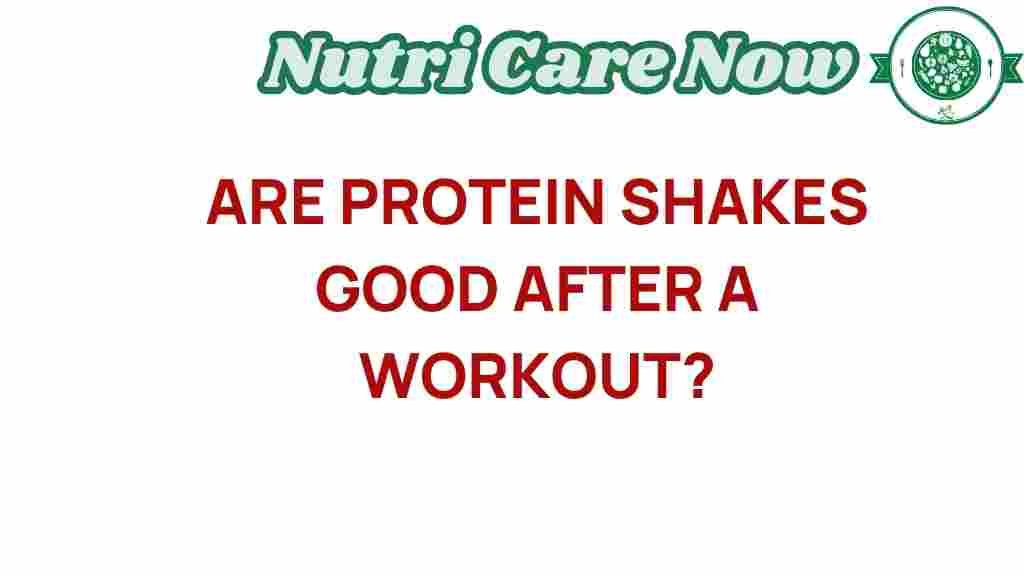The Truth About Protein Shakes: Are They Essential Post-Workout?
In the world of fitness and nutrition, protein shakes have gained immense popularity, especially among those who are dedicated to their post-workout recovery routines. But are these shakes really essential for muscle repair and overall fitness nutrition? In this article, we’ll explore the role of protein shakes in post-workout recovery, the health benefits they offer, and how they can fit into your fitness regimen.
Understanding Protein and Its Importance
Protein is a crucial macronutrient that plays a vital role in muscle repair and growth. After an intense workout, your muscles experience micro-tears, and protein helps in repairing these tears, leading to muscle growth and improved strength. Incorporating protein into your fitness nutrition can aid in:
- Muscle repair
- Reducing muscle soreness
- Enhancing recovery times
- Promoting overall health and wellness
What Are Protein Shakes?
Protein shakes are convenient workout supplements designed to provide a quick source of protein. They typically come in powder form and can be mixed with water, milk, or other beverages. The most common sources of protein in shakes include:
- Whey protein
- Casein protein
- Plant-based proteins (soy, pea, rice)
These shakes can be consumed immediately post-workout for optimal recovery.
When to Consume Protein Shakes
The timing of protein intake is essential for maximizing the benefits of protein shakes. Consuming protein shortly after exercise can enhance muscle repair and stimulate muscle protein synthesis. Here are some key points regarding timing:
- Consume your protein shake within 30 minutes post-workout for optimal results.
- Pair your protein shake with carbohydrates to replenish glycogen stores.
- Hydration is equally important; consider adding water or a hydrating beverage to your post-workout nutrition.
Health Benefits of Protein Shakes
Protein shakes offer numerous health benefits, making them a popular choice for individuals looking to improve their fitness nutrition:
- Convenience: Protein shakes are easy to prepare and consume, making them ideal for people with busy lifestyles.
- Muscle Recovery: They provide the necessary nutrients for muscle repair after intense workouts.
- Weight Management: High-protein diets can help with weight loss by promoting satiety.
- Improved Performance: Consistent protein intake can lead to better workout performance and endurance.
Protein Shakes vs. Whole Foods
While protein shakes are convenient, they should not entirely replace whole food sources of protein in your diet. Foods such as chicken, fish, eggs, legumes, and nuts also provide essential nutrients and should be included in your fitness nutrition plan. Here’s a quick comparison:
| Protein Shakes | Whole Foods |
|---|---|
| Quick and convenient | Rich in other nutrients |
| May contain added sugars | Generally lower in sugars |
| Easy to digest | May require more digestion time |
Hydration and Post-Workout Recovery
In addition to protein, hydration plays a critical role in post-workout recovery. It is essential to replenish the fluids lost during exercise. Water, electrolyte drinks, or even a protein shake mixed with water can help restore hydration levels. Here are some hydration tips:
- Drink water before, during, and after your workout.
- Consider electrolyte drinks if you’ve had an intense workout session.
- A protein shake can contribute to your overall fluid intake.
How to Choose the Right Protein Shake
With so many options available, choosing the right protein shake can be overwhelming. Here are some factors to consider:
- Ingredients: Look for shakes with minimal added sugars and artificial ingredients.
- Protein Source: Choose a protein source that aligns with your dietary preferences (whey, casein, plant-based).
- Brand Reputation: Opt for reputable brands that offer transparency regarding their sourcing and production processes.
Potential Drawbacks of Protein Shakes
While protein shakes have their benefits, they also come with potential drawbacks:
- Overconsumption: Relying too heavily on shakes may lead to excessive protein intake.
- Not a Meal Replacement: They should not replace balanced meals rich in whole foods.
- Digestive Issues: Some individuals may experience bloating or discomfort from certain protein sources.
Step-by-Step: Incorporating Protein Shakes into Your Routine
Here’s a simple guide on how to effectively incorporate protein shakes into your post-workout recovery:
- Assess Your Protein Needs: Determine how much protein you need based on your activity level, goals, and body weight.
- Choose Quality Protein: Select a protein shake that meets your dietary needs and preferences.
- Plan Your Post-Workout Nutrition: Prepare your shake in advance or keep a protein powder handy for convenience.
- Combine with Carbohydrates: Add fruit or oats to your shake for added carbohydrates to enhance recovery.
- Stay Hydrated: Drink water alongside your protein shake to support hydration.
Troubleshooting Tips for Common Issues
If you encounter issues with protein shakes, consider these troubleshooting tips:
- Stomach Discomfort: Try a different protein source or reduce your serving size.
- Unpleasant Taste: Mix with fruits, or try flavored options to enhance the taste.
- Feeling Overfull: Adjust the serving size or time your shake according to your hunger levels.
Conclusion
Protein shakes can be a valuable addition to your post-workout recovery routine, offering convenience and essential nutrients for muscle repair. However, they should complement a balanced diet rich in whole foods rather than replace it. Understanding your own body’s needs, the role of hydration, and how to choose the right shake can help you maximize the benefits of these workout supplements.
Ultimately, the decision to incorporate protein shakes into your fitness nutrition plan should be based on your individual goals, preferences, and lifestyle. For more tips on nutrition and recovery, check out this comprehensive guide.
For more in-depth research on protein shakes, visit this external resource for valuable insights and studies.
This article is in the category Fitness and created by NutriCareNow Team
